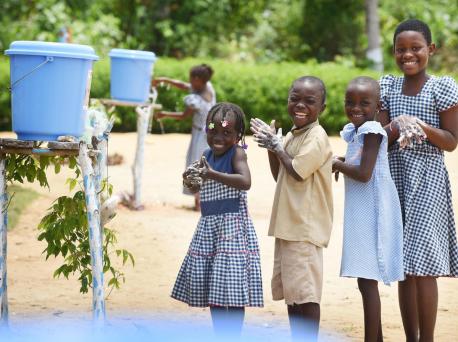
Five Ways Handwashing Saves Lives and Makes Children Smarter
The world has made remarkable progress in child survival in the past few decades, but children under 5 are, on average, 20 times more likely to die from diarrheal diseases associated with poor water, sanitation and hygiene services than from violence in conflict.
How to prevent these deaths? The answer is simple: Clean hands save lives.
Easy and affordable, frequent handwashing with soap is a remarkably effective way to prevent infection and stop the spread of disease. Even in developing countries, soap is rarely in short supply. But it's often reserved for laundering clothes or bathing, not washing hands. UNICEF and partners are working in more than 100 countries to improve water, sanitation and hygiene (WASH) facilities, and to teach children that handwashing can be the difference between life and death.

1. HANDWASHING STOPS DISEASE FROM SPREADING. After an Ebola outbreak began in the Democratic Republic of the Congo (DRC) in August 2018, UNICEF and partners launched a campaign to teach children about the importance of handwashing. Above, Jean Marie Bofio, UNICEF WASH Officer, explains disease prevention to a group of children near Mangina, North Kivu, DRC. “Children and women are among the first victims of the Ebola outbreak in the country," says Bofio. "Water and sanitation are critical in this fight because hygiene is the best way to prevent the spread of this deadly disease.” © UNICEF/UN0229510/Naftalin

2. CLEAN HANDS PROTECT CHILDREN FROM DIARRHEA. Both a cause and an effect of malnutrition, diarrhea remains a leading killer among children under age 5 globally. Above, a mother washes her daughter's hands at the Bellafarendi health center in Timbuktu, Mali, where she was being treated for severe acute malnutrition. © UNICEF/UN0126761/Dicko

3. WHEN SCHOOLS ARE EQUIPPED WITH WATER FOR HANDWASHING, STUDENTS ARE HEALTHIER. A 2016 global survey found that 53 percent of schools worldwide had handwashing facilities with soap and water available. Eleven percent had handwashing facilities but no soap, and 36 percent had no handwashing facilities at all. That means more than 850 million children can't properly wash their hands at school. That means higher absenteeism and more missed instruction. Above, 12-year-old Bajilio gives a thumbs-up to show how easy it is to wash hands after UNICEF and partners installed new taps and toilets in his school in Timor-Leste. © UNICEF/UN0227875/Helin

4. ADOLESCENT GIRLS WHO GO TO SCHOOLS WITH ADEQUATE SANITATION FACILITIES HAVE BETTER ATTENDANCE. When schools lack private toilets and running water, menstruating girls are more likely to stay home because they have no place to go to manage their periods. Some miss so much school they end up dropping out. Above, a Rohingya girl washes her hands on Global Handwashing Day at a Child-Friendly Space at the Balukhali makeshift refugee camp in Cox’s Bazar, Bangladesh, in October 2017. © UNICEF/UN0139603/LeMoyne

5. KIDS WHO GROW UP WASHING THEIR HANDS WILL TEACH THEIR CHILDREN TO DO THE SAME. UNICEF and partners are training teachers in three key hygiene practices: proper use of latrines, use of safe drinking water and handwashing with soap. Above, young children line up to wash their hands at a washing station outside their school in Essankro, Côte d'Ivoire. © UNICEF/UN0208010/Dejongh
Top photo: Students wash their hands with soap at school in Essankro, Côte d'Ivoire. Clean hands save lives, but regular handwashing is not yet a common practice in Côte d'Ivoire, where one out of three people living in rural areas do not have access to clean, safe water. © UNICEF/UN0208005/Dejongh
HOW TO HELP
There are many ways to make a difference
War, famine, poverty, natural disasters — threats to the world's children keep coming. But UNICEF won't stop working to keep children healthy and safe.
UNICEF works in over 190 countries and territories — more places than any other children's organization. UNICEF has the world's largest humanitarian warehouse and, when disaster strikes, can get supplies almost anywhere within 72 hours. Constantly innovating, always advocating for a better world for children, UNICEF works to ensure that every child can grow up healthy, educated, protected and respected.
Would you like to help give all children the opportunity to reach their full potential? There are many ways to get involved.



